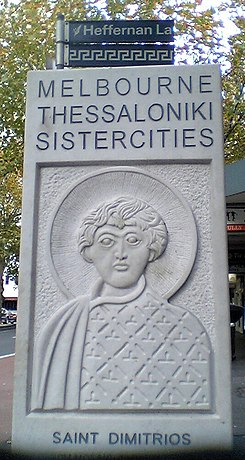Greeks of Melbourne: Difference between revisions
No edit summary |
No edit summary |
||
| Line 28: | Line 28: | ||
{{Greeks}} |
{{Greeks}} |
||
Greeks in Melbourne are largely concentrated in the southeastern and northeastern suburbs, however there are many dispersed throughout the city. |
Greeks in Melbourne are largely concentrated in the southeastern and northeastern suburbs, however there are many dispersed throughout the city. |
||
== Culture == |
|||
Greek cafés, restaurants, taverns, bars and nightclubs can be found throughout Melbourne. Key areas include [[Oakleigh,Victoria|Oakleigh]], [[Bentleigh,Victoria|Bentleigh]], [[Doncaster, Victoria|Doncaster]], [[South Yarra, Victoria|South Yarra]] and the [[Melbourne central business district|Melbourne CBD]]. |
|||
== Notable Greek Melburnians == |
== Notable Greek Melburnians == |
||
Revision as of 03:36, 20 January 2022
| Total population | |
|---|---|
| Greeks 173,598 by ancestry (3.87% of Greater Melbourne's population) | |
| Languages | |
| Religion | |
| Greek Orthodox | |
| Related ethnic groups | |
| part of Greek Australians |


The Greek community of Melbourne (Greek: Έλληνες της Μελβούρνης) is one of the largest Greek diaspora communities in the world and Melbourne hosts the largest Greek-speaking population outside of Greece and Cyprus. According to the 2016 Australian census, Melbourne has the largest Greek population in Australia with 173,598 Greeks, making up 3.87% of Greater Melbourne's population. Globally, Hellenic identity and values are passed on from one generation to the next and do not depend upon one's location in the world. As such, 88% of Greek Australians (regardless of country of birth) speak Greek and 91% are members of the Greek Orthodox Church, although many identify as 'culturally Orthodox' rather than religiously Orthodox, especially among the younger generations.[1] As a result of the extensive historical and cultural ties between the Greek community of Melbourne and their Greek homeland, Melbourne is a sister city to Thessaloniki, Greece's second largest city and cultural centre.[2]
Modern Greek civilisation in Melbourne is perpetuated by three Greek Australian day schools, dozens of after-hours 'Greek schools', a network of aged care and welfare societies, many community and cultural organisations, brotherhoods, and sporting clubs. The Neos Kosmos newspaper serves the community. The Hellenic Museum located in Melbourne's CBD tells the ongoing story of the Greeks in Melbourne and houses the Hellenic Foundation for Culture's centre. Furthermore, the World Council of Hellenes Abroad maintains a presence in the city.
Hellenic student organisations are present at all seven universities located in Melbourne and maintain a high participation rate by Greek students. The National Union of Greek Australian Students (NUGAS) is based in Melbourne. Additionally, the American Hellenic Educational Progressive Association, dedicated to Hellenic ideals of education, philanthropy, civic responsibility, family and individual excellence, possesses a chapter in Melbourne.
The Greeks of Melbourne have made a rich contribution to Victorian society through achieving a high level of educational attainment and business ownership. Additionally, Melbourne's landscape has been shaped by Hellenic influence: the Eureka Tower, the tallest building in Melbourne's skyline, was designed by Greek Australian Nonda Katsalidis. Many of Melbourne's landmarks feature prominent Greek designs including Parliament House, the Shrine of Remembrance and the State Library.[3]
Australia's democratic and multicultural atmosphere has allowed Greek culture and community life to flourish in Melbourne. Over the years, various events have been held in Melbourne to remember the destruction of Greek communities as a result of the Greek genocide and Greek Operation of the NKVD. In March 2021, Melbourne's Greek community received $200,000 from the Victorian Government to fund events commemorating the 200th anniversary of Greek Independence.[4]
Demographics
| Part of a series on |
| Greeks |
|---|
 |
|
History of Greece (Ancient · Byzantine · Ottoman) |
Greeks in Melbourne are largely concentrated in the southeastern and northeastern suburbs, however there are many dispersed throughout the city.
Culture
Greek cafés, restaurants, taverns, bars and nightclubs can be found throughout Melbourne. Key areas include Oakleigh, Bentleigh, Doncaster, South Yarra and the Melbourne CBD.
Notable Greek Melburnians
- Christos Tsiolkas, author
- George Calombaris, chef
- Mary Coustas, comedian
- Nick Giannopoulos, comedian
- George Megalogenis, journalist
- Ana Kokkinos, director
- Alex Papps, actor
- Gina Riley, actress
- Olympia Valance, actress
- Patricia Karvelas, actress
- Jenny Mikakos, Labor politician
- Steve Dimopoulos, Labor politician
- Maria Vamvakinou, Labor politician
- Luke Beveridge, AFL coach
- David Zaharakis, AFL player
- Athas Hrysoulakis, former AFL player
- Ange Postecoglou, soccer manager
- Peter Hatzoglou, cricketer
Greek Cypriots
The 2016 census recorded 7,575 Cyprus-born people in Victoria, the majority of them being Greek Cypriots.[5] There are many more Australian-born Greek Cypriots. The largest waves of Cypriots to Melbourne came as a result of the 1974 Turkish invasion of Cyprus, however Cypriots have been emigrating to Victoria since the Gold Rush. There are significant numbers of Cypriots particularly in the Northern and South Eastern suburbs. Intermarriage of Greek Cypriots with other Greek Australians is common. The Bentleigh Greens Soccer Club (based in Cheltenham, in Melbourne's southeast) was formed in 1986 by the local Greek Cypriot community.
Notable Greek-Cypriot Melbournians
- Andrew Demetriou, former CEO of AFL
- Anthony Koutoufides, former AFL player
- Andrew Theophanous, Labor politician
- Theo Theophanous, Labor politician
- Kat Theophanous, Labor politician
- Harry Nicolaides, writer
Notable establishments
- Asylum Seeker Resource Centre founded by Kon Karapanagiotidis
- Aesop founded by Dennis Paphitis
See also
References
- ^ SBS. "Greek Culture - Cultural Atlas". Retrieved 20 January 2022.
- ^ City of Melbourne. "International relations - Thessaloniki". Retrieved 7 August 2009.
- ^ University of Melbourne. "Finding the Hidden Hellenism in Melbourne". Retrieved 20 January 2022.
- ^ Victorian Government. "Celebrating 200 Years Of Greek Independence". Retrieved 20 January 2022.
- ^ origins.museumsvictoria.com.au https://origins.museumsvictoria.com.au/countries/cyprus/. Retrieved 8 January 2022.
{{cite web}}: Missing or empty|title=(help)
